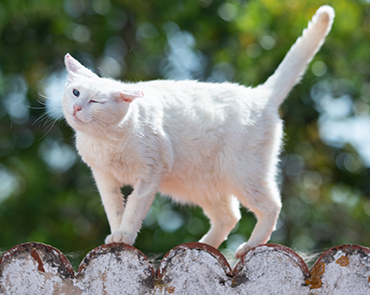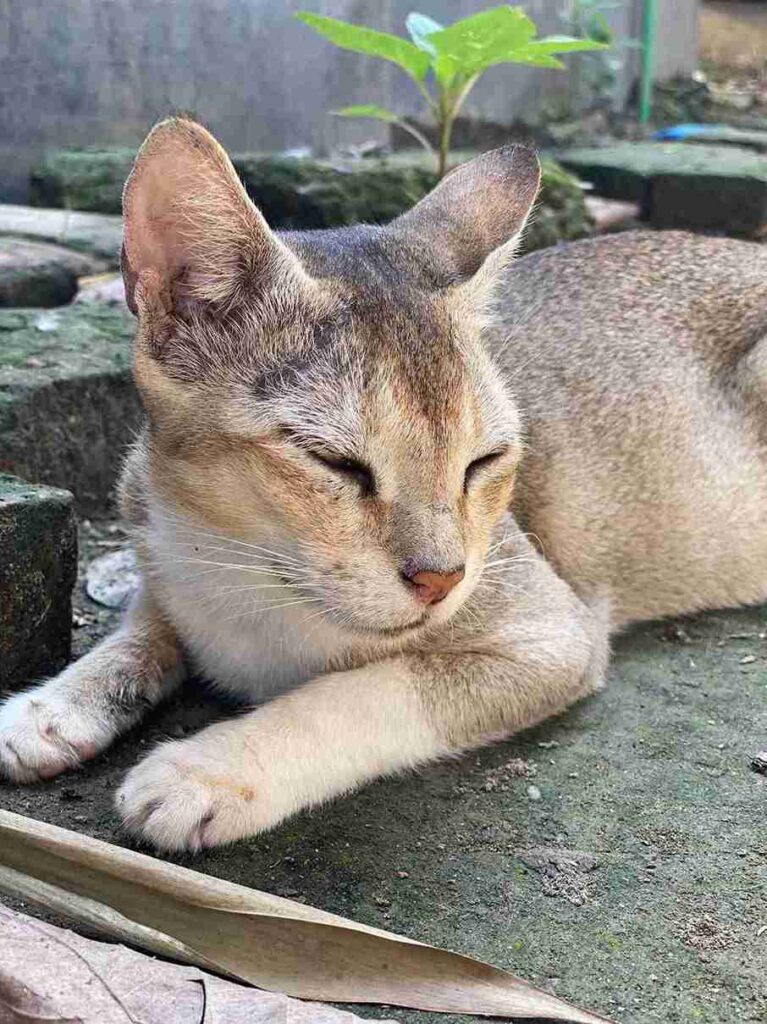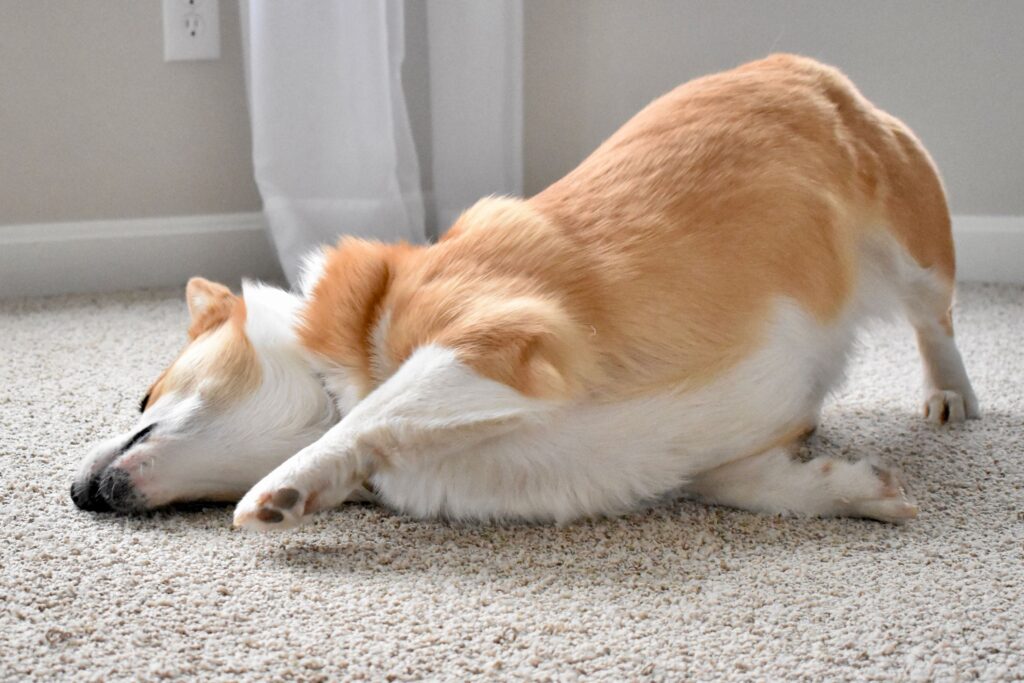Cats shake their heads after you pet them to reset their senses and remove any lingering stimulation. Cats often shake their heads to restore balance and dislodge any excess hair or dirt.
It is a natural behavior for cats to shake their heads as a way of self-grooming and maintaining their overall well-being. Whether it is to disperse any tickling sensations or to regain composure, head shaking is an instinctive response for cats.
Understanding this behavior can help you better interact and care for your feline companion.
Contents
- 1 **understanding Cat Behavior After Petting**
- 2 **exploring Physiological Factors**
- 3 **examining Sensory Responses**
- 4 **addressing Discomfort And Irritation**
- 5 **dealing With Stress And Anxiety**
- 6 **understanding Social Interaction Cues**
- 7 **recognizing Medical Concerns**
- 8 **providing Appropriate Care And Attention**
- 9 **seeking Professional Help**
- 10 Frequently Asked Questions Of Why Do Cats Shake Their Heads After You Pet Them?
- 11 Conclusion
**understanding Cat Behavior After Petting**
Cats shaking their heads is a common behavior that many owners may notice after petting them. There are several possible reasons why cats shake their heads. One reason could be that they are simply trying to shake off any excess stimulation or excitement from the petting session. It could also be a way for them to readjust their fur or get rid of any discomfort or irritation that may have occurred during petting. Understanding feline behavior is important for owners to better understand their cats’ needs and preferences.
By observing their cats’ body language and behavior, owners can gain insight into what their cats are feeling or trying to communicate. It’s essential to recognize that individual cats may have different reactions, so it’s important to pay attention to the specific cues and signals exhibited by each cat. Ultimately, understanding why cats shake their heads after being petted can help owners provide the best care and companionship for their feline friends.

Credit: www.pdsa.org.uk
**exploring Physiological Factors**
When cats shake their heads after being petted, several physiological factors come into play. One of these factors is the sensitivity of their ears. A cat’s ears are incredibly sensitive and can pick up sounds and vibrations that humans cannot perceive. This heightened sensitivity is due to the presence of more than 20 individual muscles that allow cats to move their ears independently in different directions.
Another important factor is the role of the vestibular system, which is responsible for maintaining balance and coordination. When a cat’s head is petted, this system can be stimulated, causing the cat to shake its head in an attempt to regain equilibrium.
Overstimulation through petting can also lead to head shaking in cats. While most cats enjoy gentle petting, excessive or rough petting can become overwhelming for them. This overstimulation can trigger a reflexive response, causing the cat to shake its head as a way to cope with the sensory overload.
**examining Sensory Responses**
When you pet a cat, it’s not uncommon to notice them shaking their heads afterward. This behavior is often a result of the sensory responses triggered by tactile stimulation. Cats possess a highly sensitive nervous system, making them extremely reactive to touch.
Their skin is packed with specialized nerve endings called mechanoreceptors, which respond to mechanical pressure. Petting can activate these receptors, providing a pleasurable sensation. However, too much stimulation can become overwhelming for cats, leading to head shaking.
In addition to the tactile aspect, proprioception also plays a crucial role. Proprioception refers to the cat’s ability to sense their body position and movement. When they shake their head, it helps them recalibrate their proprioceptive sense, ensuring they maintain balance and spatial awareness.
So, the next time your cat shakes their head after being petted, remember that it’s simply their way of regulating sensory overload and reestablishing equilibrium.
**addressing Discomfort And Irritation**
When cats shake their heads after being petted, it may be indicative of discomfort or irritation. This behavior can be caused by a variety of factors, such as allergies and parasitic infections.
Allergies: Cats can be allergic to certain substances, including pollen, dust mites, or certain types of food. When exposed to allergens, they may experience itching and discomfort, leading to head shaking.
Parasitic infections: External parasites like fleas or ear mites can cause irritation and itchiness in a cat’s ears. This discomfort can trigger head shaking as the cat tries to alleviate the irritation.
**dealing With Stress And Anxiety**
Cats, being sensitive creatures, may exhibit head shaking behavior after being petted due to stress and anxiety. These feline companions rely on routine and familiar environments to feel secure, and any disruption to their comfort zone can result in heightened stress levels.
During petting sessions, there can be various stressors that trigger head shaking. For instance, cats may not enjoy being petted in certain areas, such as their bellies or paws. They may also have sensitive spots that cause discomfort when touched. In such cases, they may shake their heads as a way to alleviate the discomfort.
Anxiety can also contribute to head shaking behavior. Cats may feel anxious due to loud noises, changes in their environment, or unfamiliar people or animals in their surroundings. This anxiety can manifest in head shaking as a nervous response to the perceived threat or discomfort.
In conclusion, cats shake their heads after being petted for various reasons, including stress and anxiety. Understanding their sensitivities and providing a calm and comforting environment can help minimize these behaviors.
**understanding Social Interaction Cues**
Understanding cat behavior can be a fascinating journey. One common behavior that many cat owners observe is head shaking after petting their furry feline. This behavior can serve as a social interaction cue, allowing cats to communicate various messages through their body language.
Head shaking in cats can have different meanings depending on the context. It can be a way for a cat to indicate that they have had enough petting and want to be left alone. It can also be a sign of excitement or overstimulation, especially if the shaking is accompanied by other signs of agitation like tail flicking or dilated pupils.
When interpreting a cat’s behavior, it is essential to consider the overall context and other body language signals the cat might be displaying. For instance, a cat shaking its head while purring and rubbing against your leg might simply be expressing affection and pleasure.
It’s important to understand that every cat is unique, and their body language can vary. By observing and paying attention to their cues, we can better understand our feline friends and strengthen our bond with them.
**recognizing Medical Concerns**
Recognizing medical concerns is crucial when trying to understand why cats shake their heads after being pet. One potential cause is ear infections and their symptoms. Cats with ear infections may exhibit head shaking as a way to relieve discomfort. Common symptoms include redness, swelling, discharge, and a foul odor emanating from the ears. Another possible reason for head shaking is the presence of ear mites. These tiny parasites can irritate a cat’s ears, leading to shaking as a response. It’s important to note that other medical issues may also contribute to head shaking, such as allergies or foreign objects lodged in the ears. Observing any abnormal behavior, including excessive head shaking, warrants a visit to the veterinarian for a proper diagnosis and treatment.
**providing Appropriate Care And Attention**
To provide appropriate care and attention to your cat, it is essential to understand their behavior and needs. When it comes to petting, using gentle techniques is crucial for their comfort. Cats may shake their heads after being petted due to various reasons. Recognizing signs of discomfort or distress, such as ears flattening or tail twitching, can help you adjust your petting and avoid overstimulation. Creating a comfortable and stress-free environment also contributes to your cat’s well-being. This includes providing a safe space, regular feeding, and playtime, as well as minimizing loud noises or sudden movements that may startle them. Remember that every cat is unique, so it’s important to observe and respect their individual preferences. By providing appropriate care and attention, you can strengthen the bond with your furry friend and ensure their happiness.
**seeking Professional Help**
Cats shaking their heads after being petted can be a sign of various issues, some of which may require veterinary attention. While occasional shaking is normal, persistent or severe shaking may indicate underlying health problems.
| When to consult a veterinarian | Importance of regular check-ups | Addressing underlying health issues |
|---|---|---|
| 1. If the shaking is accompanied by other symptoms such as excessive scratching, ear discharge, or behavior changes. | 1. Regular vet visits can help detect and prevent health issues before they become serious. | 1. A vet can examine the cat’s ears for any infections or mites, perform tests, and recommend appropriate treatment. |
| 2. If the shaking persists or worsens over time. | 2. Routine check-ups allow for the monitoring of the cat’s overall health and well-being. | 2. Identifying and addressing any underlying conditions can help alleviate discomfort and improve the cat’s quality of life. |
| 3. If the cat shows signs of pain or discomfort during or after the shaking. | 3. Regular veterinary care helps establish a baseline for the cat’s health, making it easier to spot deviations. | 3. In some cases, medication or specialized treatments may be necessary to resolve the issue. |
Remember, it is always best to consult a veterinarian for a proper diagnosis and guidance on how to best care for your cat’s specific needs.
Frequently Asked Questions Of Why Do Cats Shake Their Heads After You Pet Them?
What Does It Mean When Cats Shake Their Heads?
Cats shaking their heads could indicate ear problems, like ear mites or infections. It is essential to check their ears and consult a vet for proper diagnosis and treatment.
Why Does My Cat Shake His Head When I Scratch His Ears?
When you scratch your cat’s ears, it may shake its head as a natural response to the sensation. It could indicate pleasure or discomfort, so observe your cat’s behavior for any signs of ear mites or infections.
Why Do Cats Turn Their Heads When You Pet Them?
Cats turn their heads when you pet them to explore their environment, show trust, and allow you to reach their favorite spots.
Why Do Cats Shake Their Heads After You Pet Them?
When cats shake their heads after being petted, it could be due to overstimulation. They may be trying to alleviate the sensations or redistribute their fur. Another reason could be that they are shaking off excess energy or adjusting their balance.
It’s a natural behavior for cats and shouldn’t be a cause for concern.
Conclusion
The head shaking behavior observed in cats after being petted can be attributed to various reasons. It might occur as a way to dislodge any uncomfortable or ticklish sensations, or as a signal of overstimulation. Understanding these behaviors can help us better communicate and bond with our feline friends.
So next time your cat shakes its head after you pet them, remember that it’s their unique way of expressing themselves.

Katie Lindsey is a passionate cat lover and founder of Cats Solution, a comprehensive resource for all things feline. With a lifelong love for cats and extensive knowledge in their care and behavior, she provides expert advice and solutions to cat owners. Through her website, Katie fosters a supportive community where cat enthusiasts can find guidance and heartwarming stories. A dedicated advocate for animal welfare, Katie also promotes responsible pet ownership and adoption. Join her on this purr-fect journey celebrating the joy of feline companionship.



